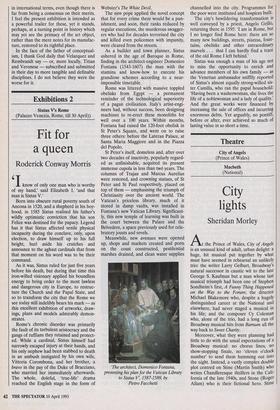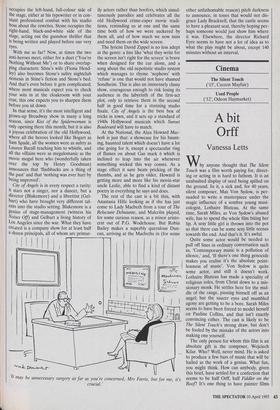Theatre
City of Angels (Prince of Wales) Macbeth (National)
City lights
Sheridan Morley
Athe Prince of Wales, City of Angels is an unusual kind of adult, urban delight: a huge, hit musical put together by what must have seemed in rehearsal an unlikely trio: the writer Larry Gelbart, Broadway's natural successor in caustic wit to the late George S. Kaufman but a man whose last musical triumph had been one of Stephen Sondheim's first, A Funny Thing Happened on the Way to the Forum; the director Michael Blakemore who, despite a hugely distinguished career at the National and elsewhere, had never staged a musical in his life; and the composer Cy Coleman who, alone of the trio, had a long run of Broadway musical hits from Barnum all the way back to Sweet Charity. Moreover, what they were planning had little to do with the usual expectations of a Broadway musical: no chorus lines, no show-stopping finale, no 'eleven o'clock number' to send them humming out into the night. Instead, a vastly complex double plot centred on Stine (Martin Smith) who writes Chandleresque thrillers in the Cali- fornia of the late 1940s, and Stone (Roger Allam) who is their fictional hero. Stine occupies the left-hand, full-colour side of the stage, either at his typewriter or in con- stant professional combat with his studio boss about the rewrites. Stone occupies the right-hand, black-and-white side of the stage, acting out the gumshoe thriller that is being written and played before our very eyes.
With me so far? Now, at times the two anti-heroes meet, either for a duet (`You're Nothing Without Me') or to share overlap- ping characters: Stine's wife (Fiona Hend- ley) also becomes Stone's sultry nightclub nemesis in Stine's fiction and Stone's bed. And that's even before it gets complicated; where most musicals expect you to check Your wits in at the cloakroom with your coat, this one expects you to sharpen them before you sit down.
In that sense, it's the most intelligent and grown-up Broadway show in many a long season, since Kiss of the Spiderwoman is only opening there this month; but it is also a joyous celebration of the old Hollywood, Where all the heroes looked like Bogart as Sam Spade, all the women were as sultry as Lauren Baca11 teaching him to whistle, and all the villains were as megalomanic as the movie mogul here who (wonderfully taken over the top by Henry Goodman) announces that 'flashbacks are a thing of the past' and that 'nothing was ever hurt by being improved'.
• City of Angels is in every respect a rarity: it stars not a singer, nor a dancer, but a director (Blakemore) and a librettist (Gel- ban) who have brought very different tal- ents into the studio setting. Blakemore is a genius of stage-management (witness his Noises Off) and Gelbart a living history of Los Angeles since the war. What they have created is a company show for at least half a dozen principals, all of whom are primar- ily actors rather than hoofers, which simul- taneously parodies and celebrates all the old Hollywood crime-caper movie tradi- tions, reminding us at one and the same time both of how we were suckered by them all, and of how much we now miss and need them on the wide screen.
The lyricist David Zippel is no less adept at the genre: a line like 'what they write for the screen isn't right for the screen' is brave when designed for the ear alone, and a song about the old nepotistic studio system which manages to rhyme 'nephews' with 'refuse' is one that would not have shamed Sondheim. This is also an immensely classy show, courageous enough to risk losing its audience in the labyrinth of the first-act plot, only to retrieve them in the second half in good time for a stunning studio finale. City of Angels is the best box of tricks in town, and it sets up a standard of 1940s Hollywood musicals which Sunset Boulevard will have to match.
At the National, the Alan Howard Mac- beth is just that: a showcase for his haunt- ing, haunted talent which doesn't have a lot else going for it, except a spectacular ring of flames on about Gas mark 6 which is inclined to leap into the air whenever something wicked this way comes. As a stage effect it sure beats pricking of the thumbs, and as he gets older, Howard is getting more and more like his movie-star uncle Leslie, able to find a kind of distant poetry in everything he says and does.
The rest of the cast is a bit thin, with Anastasia Hille looking as if she has just come to Lady Macbeth from a tour of The Reluctant Debutante, and Malcolm played, for some curious reason, as a minor aristo- crat out of P.G. Wodehouse. But Robin Bailey makes a superbly querulous Dun- can, arriving at the Macbeths in (for some crucial.' other unfathomable reason) pitch darkness to announce, in tones that would not dis- grace lady Bracknell, that the castle seems to have a pleasant seat, thereby hoping per- haps someone would just show him where it was. Elsewhere, the director Richard Eyre seems to have not a lot of idea as to what the play might be about, except 140 minutes without an interval.



























































 Previous page
Previous page